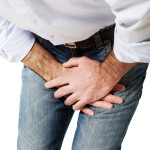
It is important to take any strong pain in your penis or testicles seriously. While there can be many causes, testicular torsion is an EMERGENCY and needs to be treated right away.
Testicular torsion or “twisting of the testes” is not common; it affects about 1 in 4000 sex assigned at birth males under the age of 25 per year. However, it is important for teen and young adult men to know about testicular torsion because surgery is needed right away to save the testes. Without surgery within a few hours of the pain starting, the testicle doesn’t get enough blood to survive and may need to be removed.
What is testicular torsion?
Testicular torsion is a medical condition that can occur in males. It occurs most commonly in teens and young men between the ages of 12-18, but can also occur in babies as well as later in life.
Testicular torsion is when the spermatic cord twists and cuts off blood flow to a testicle (or testis). Without blood flow the testis will eventually die.
The testicles are correctly attached to the scrotum in most sex assigned at birth males. However, some do not have the tissue that connects the testicles to the scrotum; this is sometimes called “bell clapper” deformity. Because the testicles can move more easily it increases their risk of testicular torsion.
Is testicular torsion a serious condition?
Yes. Testicular torsion is a serious condition, and needs to be fixed as quickly as possible. If blood flow is not restored to the testicle within approximately 6 hours, the testicle can die. In fact, the most common cause of testicle loss with testicular torsion is delay in treatment. Also, loss of a testicle may affect fertility (ability to have biological children) in the future.
What are the symptoms of testicular torsion?
Symptoms of testicular torsion include:
- Pain in the testicle*
- Swelling of the scrotum (sack that holds the testicles)
- Pain in the lower abdomen (lower belly area)
- Nausea
- Vomiting
*The testicular pain associated with torsion is usually severe and comes on suddenly.
What should I do if I think I have testicular torsion?
If you think you have testicular torsion or have pain in your testes or groin, call your health care provider immediately. They will likely recommend that you go to the emergency room, because this is a serious condition that needs treatment right away. If you cannot reach your health care provider immediately, go to the closest emergency room as soon as possible.
How is testicular torsion diagnosed?
To diagnose testicular torsion, a health care provider (HCP) will perform a clinical exam; this means that they will ask you about your symptoms and look at your testicle for any signs of swelling or redness. The HCP will likely test some of your reflexes (i.e. cremasteric reflex) by lightly touching the inside of your thigh. Doing this usually makes the testicle contract, but if you have testicular torsion this may not happen.
If your HCP is concerned about testicular torsion, they will likely refer you to an Emergency Room immediately. In the emergency room they may:
- Do a clinical exam (as mentioned above)
- Have you see a specialist, called a urologist, in the emergency room
- Get an ultrasound of your testicles to see if blood is flowing correctly to your testicle(s). This test uses sound waves to take pictures of your body.
How is testicular torsion treated?
If your health care provider feels that you have testicular torsion, you will need to have surgery right away.
- During the operation, the surgeon will untwist your testicle and check to see if it can be saved. If it can, they will place stitches around the testicle(s) to repair the twisted one and to prevent torsion from happening to the other testicle.
- If your surgeon determines that your testicle can’t be saved, they will remove your testicle, and place stitches around the other one to prevent future torsion.
Remember: The quicker you’re treated, the better the chances are that the surgeons will be able to save your testicle.
What can I expect after surgery?
After surgery, you won’t feel the stitches, but you’ll have some discomfort. Your surgeon will likely prescribe some pain medicine, rest and ice. You’ll need to take it easy for a while until you get the okay (from your HCP) that you can go back to school or work. Your provider will explain that you shouldn’t play sports, workout or do any intense physical activity until you heal which usually takes about 1-2 weeks.
Is there anything I can do to prevent testicular torsion?
Unfortunately, there isn’t anything you can do to prevent testicular torsion from happening. However, it’s always a good idea to wear proper protection when playing sports to avoid any kind of direct injury to your testicle(s). If you’ve already had surgery for testicular torsion, the stitches placed inside you will help prevent future torsion from happening.
 Young Men's Health
Young Men's Health
